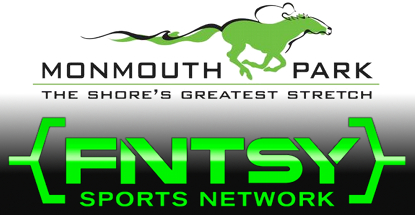By Joe Favorito @JoeFav @TheDailyPayoff
This weekend millions will take to the road to celebrate everything from graduations to communions and confirmations to Mother’s Day, but on Saturday racing and gambling enthusiasts and sports business people will also travel to Monmouth Park for the opening of the 70th season at the Jersey Shore’s crown jewel.
With one eye on the past and another on the future, those hopefuls wonder what the future will bring at Monmouth in Oceanport, NJ, where supporters continue the quest to bring a new face to the racing venue.
The park’s current owners, the Governor’s office and a host of state legislators continue to push for year-round casino gambling like what is now featured at the at former Yonkers Raceway, now Empire City Casino on the trotters side, where the racing is but an appetizer for the legal gambling.
The state will put up a referendum for vote in November that would allow casino gambling at two North Jersey sites, the Meadowlands and maybe Jersey City and if it passes, Monmouth Park and even struggling Atlantic City would get a piece of the financial pie.
The work that the New Jersey Horsemen’s Association has done in making the track already fan and family friendly in their four years of ownership has been strong. Corporations can get their own race for a fraction of the cost of a trip to a Mets or Yankees game, and can even make some money legally while you root your favorite thoroughbred’s home. The weekend of the Haskell will bring big crowds and some other Stakes weekends will also swell the stands, but for the most part a day at Monmouth is a day, unfortunately, where crowds are rare.
The big lure for many on the business side remains that ongoing fight to bring legalized sports gambling to the track and marry it with live thoroughbred racing. Challenges continue to be put forth and fought back in the courts, and dates keep getting delayed for when a legal sports book can start, even as a trial with non-financial prizes.
As far as horse racing as a stand-alone draw, last week’s Kentucky Derby with New Jersey-owned American Pharoah winning in front of a record crowd of 170,000 at Churchill Downs continues to show that elite racing has a pulse. Whether that can translate over business at regional tracks away from The Breeders Cup or The Triple Crown or even Saratoga or Keeneland on a consistent basis in the northeast remains a dream, despite all the charm and the effort that has been put into making Monmouth more of a destination. Critics say the horse racing demographics are too old, the meets too long and the lack of star power too prevalent to ever bring horse racing back to the masses.
Whether sports gambling will save brick and mortar facilities like casinos and racetracks is part of the national debate on wagering. If most of the gambling, which experts say could be in the billions, is done on a mobile device, why would millennials, a favorite target of supporters, flock to a racetrack? Las Vegas has taken the time to build itself as a warm weather destination with many things to do beyond gambling on games, so the draw is the experience, not the gambling room per se. A track like Monmouth during its racing season could use sports gambling as the bait, and could use its location, its grounds for concerts and other events, and then the thrill of horse racing as the switch to fill the stands.
If that happens, you could see brands investing in marketing in and around the track on weekends, with new food offerings and other services like we see at ballparks popping up with a vested interest in growing the fan experience. The track would also get a solid infusion of capital from whoever its traditional betting partner would be. Right now it appears that William Hill, the British bookmaker that is one of several betting houses to have set up a business structure in the US, might be the partner of choice. Monitoring the gambling debate, it already owns a bar at the track and sponsor the Haskell. There the investment was low risk, high reward should sports gambling shake out and Monmouth becomes a daily and weekly hub on the gambling side.
Where all this plays out is now anyone’s guess. Pay fantasy companies like Draft Kings and Fan Duel have invested and raised millions taking advantage of the pay fantasy loophole in Federal law right now.
At the recent Sloan MIT Sports Conference most media types in the sport, and league officials from the NBA and MLB (who are monitoring the situation as closely as the horse racing industry) were uniform in saying that the states challenging the Federal overturn of sports betting laws will not be successful. They say ultimately sports gambling will be handled, and regulated by a consistent federal law. The estimate was that it would happen, but not before at least 3-5 years, factoring in a Presidential election cycle which could slow the process in 2016.
Until then, a beautiful track like Monmouth will continue to operate and tread water with the hopes of a change and an upswing in overall business, while trying to ride a wave of casual interest that its primary tenant, the thoroughbreds, may have as the Triple Crown plays out.
After that, the hope of warm weather and some strategic marketing will try to lure casual fans to supplement the die-hards as the track, and the horse racing industry in general, remains in flux as a sports business, with a glorious past and the promise, maybe of better days ahead with bets going down on the Rangers and Yankees bolstering the run for home just beyond the grandstand glass.
